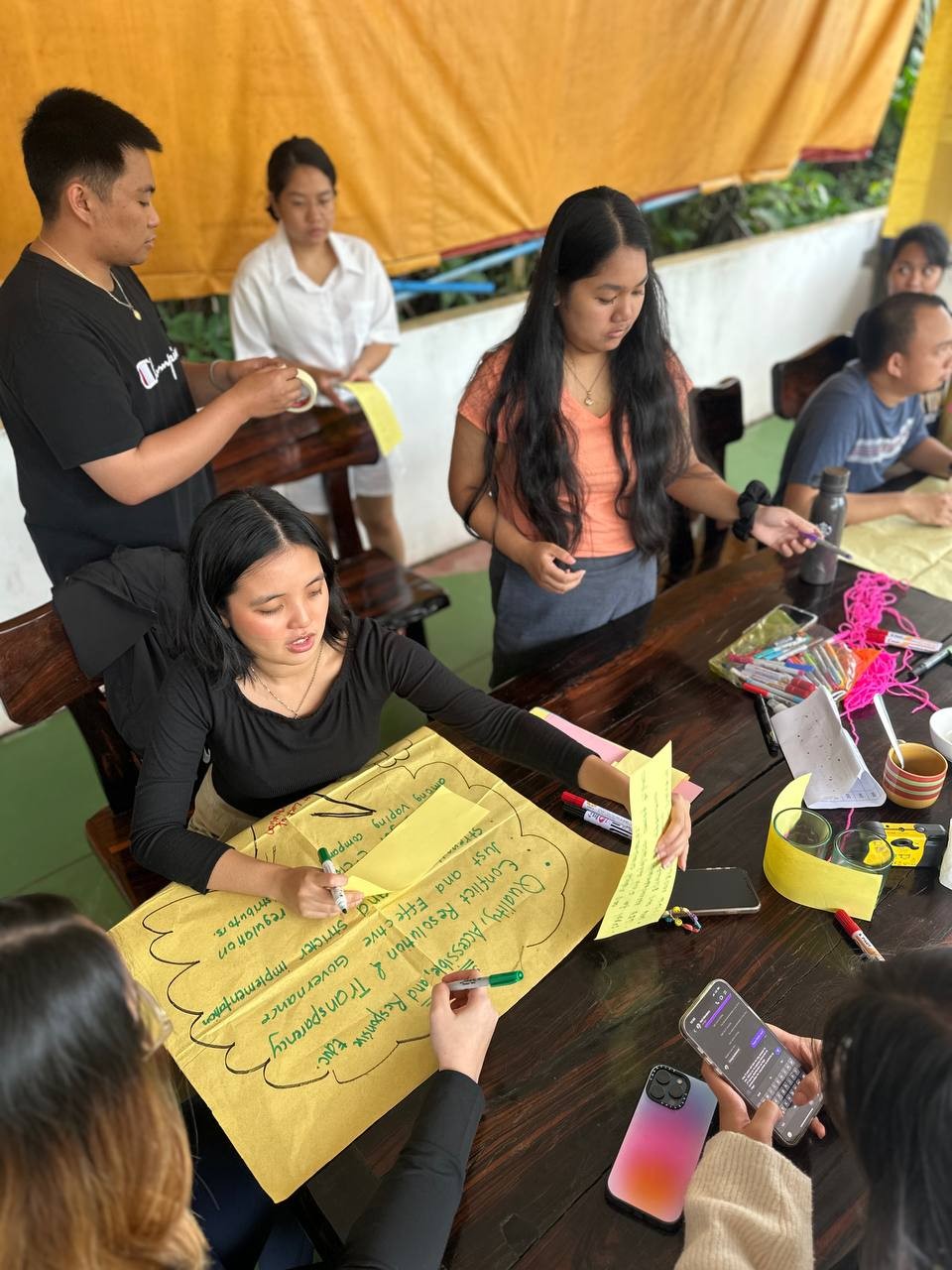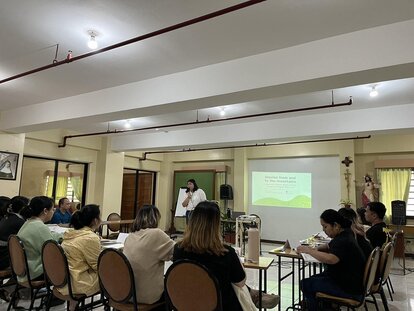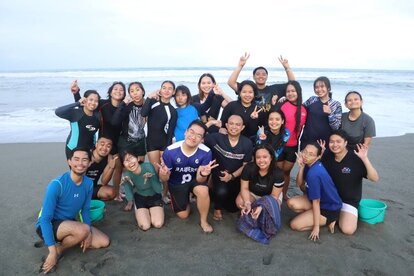Philippines
AHRC holds annual Semestral Break Internship Program (SBIP) and immersion in various communities in Casiguran

SBIP interns attended a learning session on Indigenous Peoples Rights Act (IPRA) during the Basic Orientation Seminar held in Manresa Retreat House, Quezon City. Atty. Billie Blanco, Program Officer of the Ateneo Human Rights Center, facilitated the session.
© AHRCThe Ateneo Human Rights Center (AHRC) successfully held its 2024 Semestral Break Internship Program (SBIP) on January 8 to 20, 2024, with the immersion proper taking place in Casiguran, Aurora. Twelve law students of the Ateneo Law School (ALS) were among this year’s SBIP interns.
The interns underwent a series of learning sessions and workshops on various human rights related topics during the Basic Orientation Seminar (BOS). The BOS was traditionally put in place to deepen the student-interns’ understanding and appreciation of human rights advocacies and the on-the-ground situations of the grassroots communities before going to their immersion site. This year’s BOS was facilitated by legal luminaries such as Atty. Marlon Manuel of Grassroots Justice Network and AHRC’s very own executive director Atty. Ray Paolo Santiago. Other AHRC alumni turned supervising lawyers such as Atty. Katrina Isabela Blanco, Atty. Maria Paula Villarin, and Atty. Paula Sophia Estrella, also shared their own experiences and expertise to the newest batch of interns.
Atty. Nicolene Arcaina, AHRC Internship Director stressed that this year’s SBIP program line-up was designed to drive meaningful actions among the interns. “As the new batch of interns undergo formation, the work is not just to perfect the program’s traditions as if ticking off items in a checklist. We chart the program’s direction by asking: how can one’s courage be encouraged to drive meaningful action?” she shared.

AHRC's "baby batch" Kademoy posed for a photo by the beach during the post-immersion teambuilding activity in Baler, Aurora. The team building provides the newest batch an opportunity to strengthen their group relationship and build rapport for better working relationship as resident interns of the center
© AHRCThis year’s SBIP also heralded the return of a traditional segment of the BOS: the tour to the offices of the Alternative Law Groups member organizations. As the student-interns went from office to office, they each got to have in-depth insights on the day-to-day life of advocacy work and alternative lawyering.
Sharing her BOS experience, intern Julianne Sarrosa appreciated how it revealed brand new perspectives in legal practice. “[The SBIP] gave me a new perspective on what it means to study and practice law—specifically that lawyers could also aid in empowering our fellow Filipinos beyond courtrooms and respective government offices by ‘walking with’ the marginalized in their struggles,” she said.
Another new aspect to the immersion experience since the internship program returned onsite is that the student-interns were assigned to five different communities in Casiguran. The communities’ profiles varied across different sectors and livelihoods such as farmers and fisherfolk. The main indigenous group in the area are the Agta-Dumagats, and they also occupy most of the immersion communities.
Intern Bianca Gomez, who was assigned to a community populated mostly by indigenous farmers, reflected on the complexity of the issues at play. “[SBIP] highlighted the specific issues each community is facing. However, at the end of the day, the different problems are no stranger to each other and in fact, intertwined,” she said. Gomez is also convinced that with the intersectionalities of issues confronting these communities, the resolution of one could potentially lead to the resolutions of others as well.
The Batch Kademoy (Agta-Dumagat word for “friend”) completed their one-week immersion in their respective communities of fisherfolk, farmer, and indigenous people. For the final leg of the SBIP, the internship team headed by Atty. Arcaina along with the facilitators from last year’s SBIP Batch Panaykin, conducted the Evaluation and Planning sessions (or evals as AHRC interns traditionally call it) in Baler, Aurora.
The Evaluation and Planning is a 3-day post immersion session where interns get to process their learning experiences from their immersion community. It is also an opportunity for them to identify legal issues in the communities and eventually plan out for strategies to address them moving forward. Finally, the internship batch name anchored on the interns’ on-the-ground experience is also decided during this leg of the internship program.
Taking into consideration their individual experiences and perspectives, Batch Kademoy looks forward to making the most of their AHRC journey. “My batch and I will surely continue to remember our time in Casiguran and use this as our driving force to be better in order to serve the people in the way that they deserve,” Janna Tan, Kademoy Batch Head shared.
With the new year ushering in a new batch of interns and new opportunities, AHRC continues to solidify its almost-four decades of legacy in molding lawyers that learn the law to serve the people–instilling individual change that would inspire individuals to create ripples of change. As intern Mikel Bunyi puts it, “The internship program made me discern three shifts regarding the lawyer I want to become someday: from success to fruitfulness, from ambition to fidelity, and from charity to solidarity.”
The AHRC internship program is supported by the Friedrich Naumann Foundation for Freedom Philippines. It is held bi-annually during summer (Summer Internship Program or SIP) and semestral break (Semestral Break Internship Program or SBIP).

Ateneo Human Rights Center's (AHRC) 2024 Semestral Break Internship Program (SBIP) interns conducted an issue mapping activity in their respective immersion sites during the post-immersion evaluation and planning activity in Baler, Aurora.
© AHRC
